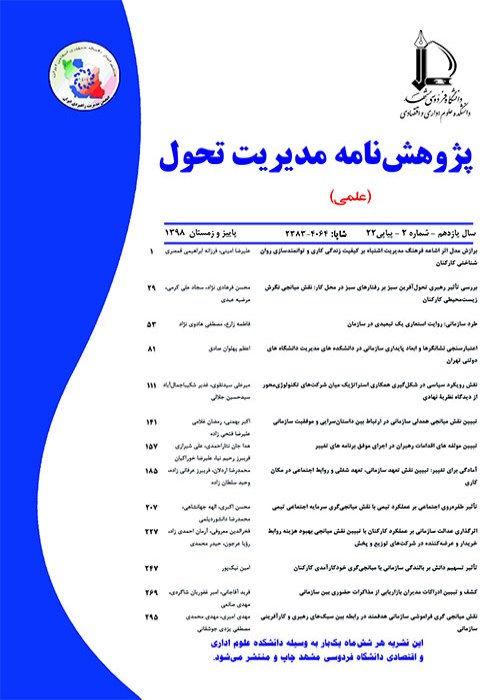The Relation between Attitude toward Organizational Change and Job Stress: Testing the Mediator Role of Organizational Commitment
Author(s):
Article Type:
Research/Original Article (دارای رتبه معتبر)
Abstract:
Introduction
The significance of the human factor in organizations has recently been taken into account in the science of human resources management and psychology; given the role of humans in productivity, growth, and development of organizations, focusing on manpower is of substantial necessity. Since universities are fields for human activities where the foundations of political, economic, cultural, and social growth of any country originate from, managers and authorities in universities should particularly pay attention to everything related to their manpower. On the other hand, the requisite for improving any organization such as universities depends on a correct identification of the changes required in line with environmental challenges as well as planning for their implementation. The absence of a proper platform regarding this area in universities along with the staff’s lack of attention toward planning for change have been completely tangible. Consequently, it is of utmost importance to examine the job stress of the staff with regards to the attitude toward organizational change and commitment, for which universities should offer appropriate mechanisms for development purposes. Given these subjects, the present study is an examination of the relation between attitude toward organizational change and job stress with the mediator role of organizational commitment.
Theoretical Framework
Changes occur constantly, at any place and any time. Changes taking place in organizations may be due to any reasons, and organizations need changes in order to survive and continue being influential. However, many organizational plans for change face failure, regardless of the effort and money invested in them. Failure in organizational plans for change could be the result of unsolicited responses such as stress, reduced organizational commitment, resistance against change, and declined levels of organizational change reception. Accordingly, the presence of stress relative to plans for change plays a very significant role in executing the processes for change. In other words, high job stress levels leads to a lower organizational commitment in staff. In return, organizational commitment is an important factor for accepting changes in organizations as well as lowering the staff’s stress levels. As a result, not only organizational commitment could describe the results of changing processes in organizations, but it also could be considered as an indicator of attitude toward organizational changes. Consequently, the beliefs, understandings, and Attitude of the staff are vital in a successful implementation of the plan.
Method
The method of the study is descriptive and the research plan is correlation through structural equations modeling. The total population of the study included the entire staff of Bu-Ali Sina University of Hamadan, i.e. 777 individuals, out of whom 215 were selected as the sample population of the study using random sampling. To estimate the number of sample population, the Cochran formula was used. As for date collection, three types of questionnaires were used including standard, attitude toward organizational change, job stress, and organizational commitment. The validity of questionnaires were examined and confirmed using the comments of management and educational sciences experts. Cronbach’s alpha was also used for the reliability of questionnaires. After collection, the data of the study were analyzed using SPSS and LISREL softwares.
Results and Discussions
The results of structural equations showed a significant, negative and positive direct impact of attitude toward organizational change on Job stress and organizational commitment, respectively. However, the impact of organizational commitment on job stress is not significant. The indirect effect of attitude toward organizational change on job stress through organizational commitment mediator is also not significant. As a result, factors that should be taken into account by university managers parallel to reducing job stress involves improving the staff’s Attitude toward organizational change and commitment.
Conclusion and Recommendations
When a process of change begins in an organization, it usually increases the staff’s Job stress which results in their resistance against changes. Yet, when individuals are committed to their organizations, they would accept the process of change easier and show less resistance as they trust the organization and feel a sense of responsibility toward it. On the other hand, committed manpower who comply with organizational purposes and values are considered as an important factor in the effectiveness of organizational change; not only the presence of such assets in organizations increases the level of performance and reduces resistance against change, but it also provides the means for decreasing job stress in line with the changes. Accordingly, when deciding on implementing organizational changes in universities, it is recommended that managers pay significant attention to having close relations with the staff, their attitude, their understanding of managers’ actions, encouraging them, and constant enhancement of the work space as well as the contexts for increasing organizational commitmentKeywords:
Language:
Persian
Published:
Transformation Managemet Journal, Volume:9 Issue: 1, 2017
Pages:
1 to 23
magiran.com/p1894321
دانلود و مطالعه متن این مقاله با یکی از روشهای زیر امکان پذیر است:
اشتراک شخصی
با عضویت و پرداخت آنلاین حق اشتراک یکساله به مبلغ 1,390,000ريال میتوانید 70 عنوان مطلب دانلود کنید!
اشتراک سازمانی
به کتابخانه دانشگاه یا محل کار خود پیشنهاد کنید تا اشتراک سازمانی این پایگاه را برای دسترسی نامحدود همه کاربران به متن مطالب تهیه نمایند!
توجه!
- حق عضویت دریافتی صرف حمایت از نشریات عضو و نگهداری، تکمیل و توسعه مگیران میشود.
- پرداخت حق اشتراک و دانلود مقالات اجازه بازنشر آن در سایر رسانههای چاپی و دیجیتال را به کاربر نمیدهد.
In order to view content subscription is required
Personal subscription
Subscribe magiran.com for 70 € euros via PayPal and download 70 articles during a year.
Organization subscription
Please contact us to subscribe your university or library for unlimited access!



